NEWYou can now listen to Fox News articles.
Julia Ward Howe (1819-1910) gave the United States and the world some of the most exciting words ever written.
She was in Washington, D., November 1861. C. During the wartime tour of, she wrote the "Battle Hymn of the Republic". The Civil War was longer, darker and deadly than expected.
Howe's masterpiece is called the American Battle Song. Her lyrics inspired the United States for spiritual determination and sacrifice.
This word tells the heroic story of the Bible that Union soldiers marched to deathin the name of Christ to defeat slavery. I am.
He died to sanctify the man
Let's die to free the man
His truth is heading towards
31}FDR's powerful prayer American D-DAY
In modern performances, the lyrics are often changed to "Let's live to free men." Still, according to the American Battlefield Trust, about 360,000 federal soldiers responded to the martyrdom call in the name of human freedom. Their sacrifice freed four million Americans from bondage. Hundreds of thousands of South Army soldiers also died in the conflict.
The "Battle Hymn of the Republic" chorus "Glory, Glory Hallelujah" is one of the most well-known refrains in world music today.
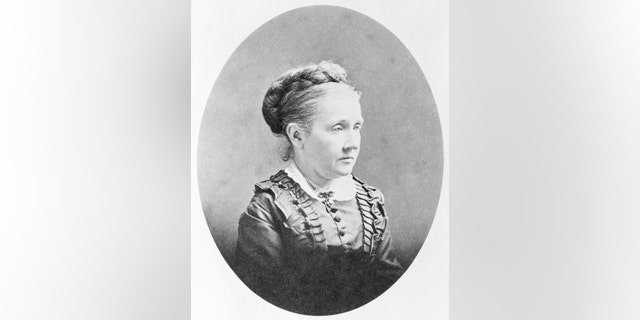
Julia Ward Howe (1819-1910) Is the author of "The Hymns of the Battle of the Republic" and contains some of the most moving words ever written. (Bettmann Archive)
But many people have forgotten the rest of the songs,the ardent ChristiansIs calling to the weapon. I deliberately erased it in a particular circle of American political spectrum. Many recent descriptions of the song cover the foundation.
But Howe's image is unmistakable. The song was deeply informed by the development of her literary Christians.
The flicker campfire of "Battle Hymn of the Republic" isthe light of the Lord; The camp is an altar where soldiers pray "in the evening dew and humidity". .. The shimmering bayonet formed for combat reflects the "burning gospel." Slavery is an Old Testament serpent crushed under the heel of Jesus Christ.
This song was deeply informed by the development of Howe's literary Christians.
The famous second line, "He is trampling on the vintage where the angry grapes are stored," is a plea of God's justice inspired by the apocalypse. (John Steinbeck picked up the phrase "The Grapes of Wrath" straight from Howe's pen when naming an American epic in 1939.)
'Words of Time'
This song created a sensation, was accepted by field soldiers and has been loved by ordinary Americans, legendary performers and world leaders for 160 years.
The "Battle Hymn of the Republic" was "sung, chanted, chanted, and used to pray on the eve of the battle," Howe later wrote. "That was the word at that time, and the Union Army marched on that momentum."
Meet the American woman who founded the Pepperridge Farm
The Mormon Tabernacle Choir won the Grammy Awards and enjoyed the only chart hit in the "Battle Hymn of the Republic"
Elvis Presley features the "Battle Hymn of the Republic" The enthusiastic "American Trilogy" ended the flashy late career performance.
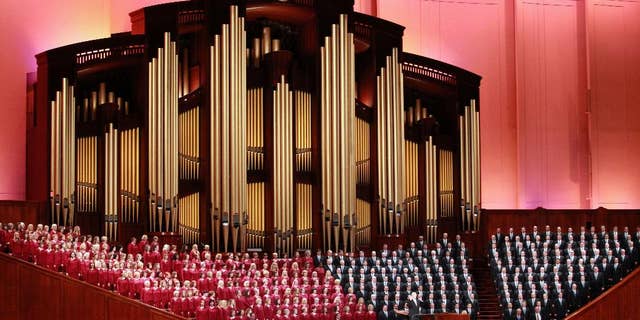
This October 1, 2016, File photo, The Mormon Tabernacle Choir of The Church of Jesus Christ of Latter-day Saints sings at the Conference Center during the morning session of the Mormon Synod in Salt Lake City. (AP Photo / George Frey, File)
Whitney Houston waving a live performance of the sailors returning from the Gulf War. The 1991 "Battle Hymn" version, just months after the performance of her iconic Super Bowl in The National Anthem.
Prime Minister Winston Churchill andPresident Ronald Reaganare one of the most famous fans of the song.
Reagan wept on January 20, 1981, with the power of the "Battle Hymn of the Republic" performed by the Mormon Tabernacle Choir during the inauguration parade.
"In an era of danger and gratitude, the Battle Hymn of the Republic is now a vehicle suitable for national sentiment, as in the [1860s]. Howe's daughter, Florence Howe Hall, wrote in her 1916 book, The Story of the Battle Hymn of the Republic. "
And in the days following the 9/11 incident, the country instinctively gathered around the" Battle Hymn of the Republic "at churches and performances, a song that speaks to the spirit of the American people. I proved that.
A bright and curious young woman
Julia Ward Howe was on May 27, 1819 in New York City with Julia Rush Cutler and Samuel Ward III. Her mother was a published poet and her father was a prominent Manhattan businessman.
Among other achievements, her father was one of the founders of what is now known as New York University. According to various sources, she is the leader of the New York Temperance Society, a devout Christian, and a prominent fundraiser for the Episcopal Church.
She published poetry and essays as a young man in her twenties.
The wealth of her family has brought a bright and curious young woman access to literature and great people in the heart of her time. She published her poems and essays as a young man in her twenties.
The Ward family was a remarkable descendant of a pedigree, including several American patriots. The family was named after the ward of Captain Normandy, who accompanied William's conqueror when he invaded England in 1066, according to the 1917 Pulitzer Prize-winning biography Julia Ward Howe. Maud Howe Elliott and Florence Howe Hall — I also wrote a book about the song itself.
America The Beautiful: 50 must-see landmarks that tell the story of our country
Jon Ward, United Kingdom, Gloucester, the first family to arrive in the United States, was a cavalry member of Oliver Cromwell's army in the late 1600s and then settled in Newport. R. I. Julia's great-grandfather, Samuel Ward, was the governor of the Colony of Rhode Island and a member of the Continental Congress. He died of smallpox in Philadelphia four months before the United States declared independence, and his death in Congress recorded byJohn Adams
was It was Samuel Ward Jr., my son, Julia's grandfather. Hero of the United States Declaration of Independence. He survived British capture, and then "Snow and Hunger in Winter Camp" at Valley Forge andGeorge Washington
Julia Ward has many features from Ward. Was inherited. They have the power and honesty of purpose, the strength of their personality, "her children wrote.
She married a Boston doctor, Samuel Glidryhow, in 1843. Among other achievements, Howe founded the first Perkins School for Blinds of this type in Watertown, Massachusetts in 1829.
Julia spent much of her adult lifeliving in Boston, traveling abroad and dining with celebrities such as Charles Dickens. ..
Still, her marriage was problematic, unfortunate, and intellectually stuffy for a healthy woman.

"Glory, glory" is loved at the university It's a tradition of George Soccer set in the song "The Hymn of the Battle of the Republic". Fans piously point to the trumpet soloist who introduces the song before each home game. (University of Georgia)
"Howe's husband did not recognize her literary ambitions and directed her actions, but he also physical. He remained physically and emotionally separated, "said the National Park Service biography.
Howe, 18 years older than her wife, died in 1876 when Julia was 56 years old. She portrayed her widow as a liberating event.
Howe wrote, "I started a new life today," the day after her funeral. She made the most of her next 35 years of life in her own words.
Julia Ward Howe inherited her ... the power and integrity of her purpose, the strength of her personality.
In particular, she spent many years as one of the main voices of women's suffrage, defending her mother's role in American society.She was the first president of the New England Women's Suffrage Association and a key figure in the Boston-based American Women's Suffrage Association.
Meet the American who invented the motorhome
She knew in 1870 as her Mother's Day declaration I submitted an invitation. Women around the world unite for peace in the wake of the horrific human genocide of the Civil War.
"Her mother has sacred and imperative words to say to her sons who owe her life to her suffering," 6 years old. Howe, the mother of. Her efforts have led to enjoyingher Mother's Day celebrationall over the world today.
'The desired route was arranged by ourselves'
Julia and her husband were in Washington, D. during the war in November 1861. C. Toured, Dr. Howe took on the role of the Federal Health Commission. An era when filth and illness were fatal problems in military camps. The writer enjoyed God's inspiration on the night of November 18th while staying at the Willers Hotel.
"The next morning I woke up in gray at dawn. Surprisingly, I noticed that the line of hope was in my brain," she later recorded. did. "I started running the line almost without seeing ... After completing this, I lay down again and fell asleep, but not before I felt something important had happened."
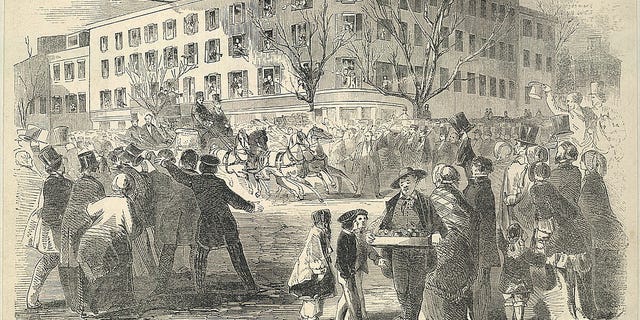
This figure is from President Franklin Pierce in Washington D. C. Indicates where to leave. The landmark Willard Hotel in a carriage in 1853. Julia Wardhow wrote "The Hymn of the Battle of the Republic" at this same hotel eight years after waking up from her dream. (Library of Congress)
She scribbled the lyrics on a piece of paper from the Sanitation Commission. They were published four months later in February 1862 at The Atlantic Monthly.
My eyes have seen the glory of the coming of the Lord
He The vintage where the angry grapes are stored Trampling
He loosened the fateful lightning bolt of his terrifying swift sword
His truth is
} We are heading towards glory, glory, Hallelujah.
Glory, glory, Hallelujah.
Glory, glory, Hallelujah.
His truth is marching at
I am 100 laps camp,
watch I saw him in. They built an altar for him in the evening dew and swamps.
You can read his righteous text on a dim and burning lamp:
His day is on the way.
(Chorus)
Fiery Gospel on a row of polished steel:
When you deal with my blame, my grace will deal with you
To the hero born of a woman, on the heels Let me crush the snake
Since God
(Chorus)
He never calls a retreat He rang no trumpet
He is sifting people's hearts in front of his seat of judgment
. Please rejoice, my feet.
Our God is
(Chorus)
Christ is in the beauty of the lily Born Beyond the Sea
Glory in his chest transforms you and me
He makes man holy We died to do, so let us die to free people
While God is marching.
The song is not her own. Based on the popular folk melody, she wrote the lyrics to the music of the existing abolitionist song "John Brown's Body". This version is Washington D. C. It was played by the army during the tour.
Her reaction to the energetic new Christian national anthem at civilian and military camps was immediate and overwhelming.
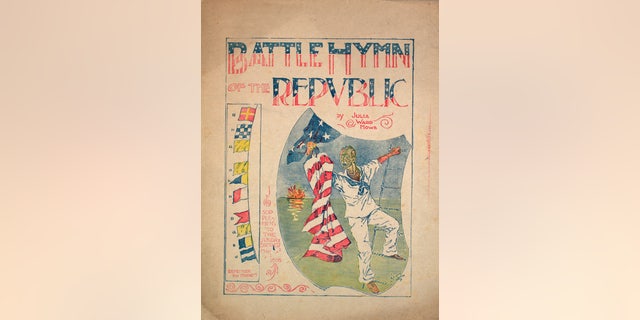
Score cover image of "Battle" Public Hymn of the Republic, by Julia Ward Howe, with lithograph or sculptural notes, 1898. (Sheridan Library / Lewy / Gado / Getty Image)
"Singing Reverend" Ohio's Captain Charles Caldwell McCabe said, "Li He was one of the Union soldiers who was immediately energized by the "Battle Hymn of the Republic".
"He was so fascinated by the lines that he remembered them before he got up from his chair," Hall wrote in her book about her mother's song. I am writing.
The Battle Hymn of the Republic inspired the minister a year later in 1863 after being taken prisoner by the brutal Libby Prison in Richmond, Virginia. Often calm darkness in prison inmates.
"He was so fascinated by the lines that he remembered them before he got out of his chair."
Prison The desperate situation of was too heavy one day in July. Men draw lots to decide to execute two officers while Union sources filter the words that the Union Army was defeated in Gettysburg and repulsed in Vicksburg. I was forced to.
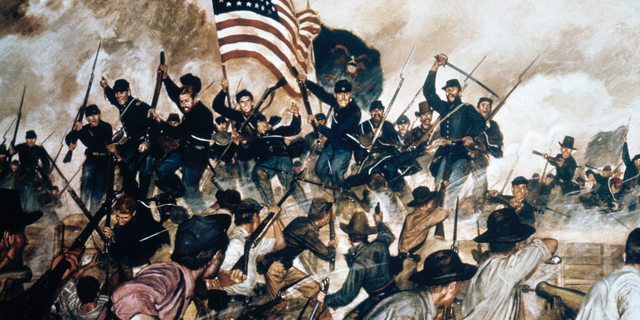
May 19, 1863 Vixberg First in 19th century painting by Hugh Charles McBaron Jr. (1902-1992) of the Civil War. American troops often participated in battles, thanks to the power of Julia Ward Howe's unforgettable American national anthem. (DeAgostini / Getty Images)
"A club deeper than death itself settled on the prisoner," Hall wrote. "The poor, thin and weakened companion broke and cried like a baby."
Then the good news came. The story of defeat was wrong. In fact, their companion won a decisive victory in Gettysburg. The flow of war turned in favor of the Union.
"500 voices sang chorus, glory, glorious Hallelujah, as men have never sung before."
Rev. McCabe immediately jumped into the box and began to sing:"My eyes saw the glory of the coming of the Lord."
"A man is this The chorus "Glory, Hallelujah of Glory" was sung by 500 voices, as if it had never been sung before, "Hall wrote. Two Union officers who intended to be executed were also celebrated. Their lives were saved in a voluntary prison explosion.
Captain McCabe later wrote, "There is no such a hymn of the Republic as the Battle Hymn of the Republic." 386}
Howe died on October 17, 1910, at her home in Portsmouth, Rhode Island, from pneumonia, which is now a National Register of Historic Places. She was 91 years old.
Her contribution to American culture has been celebrated for decades. She was the first woman to be elected to the American Academy of Arts and Letters in 1908. She was Irving Berlin, George Gershwin, W. in 1970. C. I was in the first class of the Songwriters Hall of Fame alongside. handy. And she was elected to the US Women's Hall of Fame in 1998.
Howe was honored in the "Great American Series" of American stamps in 1987.
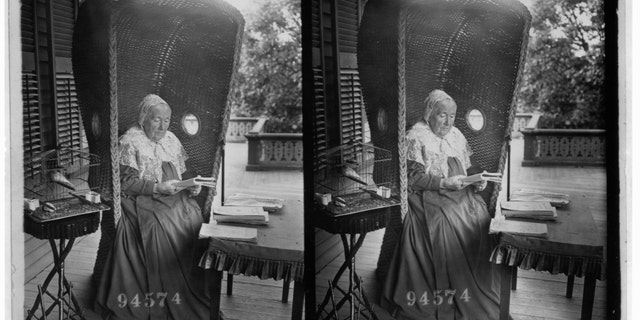
Writer Julia WardHowe (Library of Congress / Corbis / VCG, via Getty) Image)
A lighter version of her song is the national anthem of energetic sports around the world.
"Glory, Glory" is a ritual song loved by the University of Georgia football team, which dates back more than a century. Soccer fans are singing a fun full-throat version with modified lyrics, such as "Glory, Glory Tottenham Hotspur," a homage to the power of the English Premier League.
Howe's Christian Justice Trumpet helped inspire greater objectives, including theCivil Rights Movement, which was born in the Southern Pulpit.
The most notable figures were Martin Luther King Jr., Rev. Baptist of Fire and Brimstone, who led the Southern Christian Guidance Council. MLK and his organization began a march for equality in the name of Christ, a country shortage a century ago.
King, only 39 years old, gave his final soaring speech on the night of April 3, 1968.
He said, "I'm not worried about anything. I'm not afraid of someone."
Click here to sign up for the Lifestyle Newsletter
"My eyes are the glory of the coming of the Lord I've seen. "" King thundered — then he turned around, got off the Memphis stage, and applauded.
He was killed the next afternoon.
Click here to get the Fox News app
These are the last things the pastor spoke in public. It was the word of. Julia Ward Howe was in Washington D during the war more than a century ago. C. The first word of "Battle Hymn of the Republic" that I wrote early in the morning.
Kerry J. Byrne is a lifestyle reporter for FoxNews Digital.


